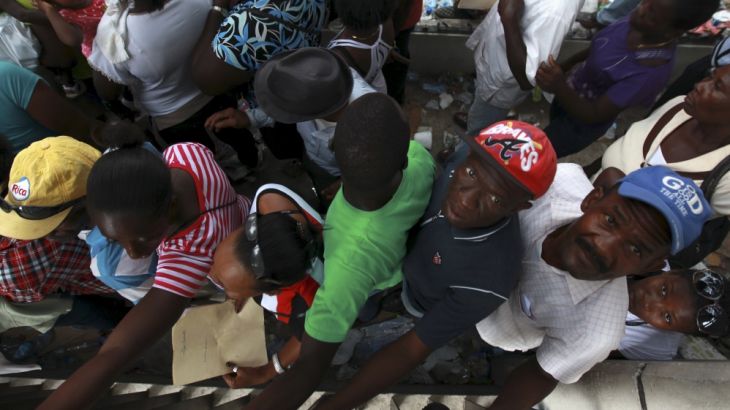Dominican deportation fears keep families on edge
Many unsure if they should await government decision on residency status or cross border to Haiti with their belongings.

Puerto Plata, Dominican Republic – We are here on the north coast of the Dominican Republic where thousands of Haitians live in poor neighbourhoods that are just a few minutes from some of the country’s most expensive beaches.
While tourists spend hundreds of dollars on kite surfing, seared tuna, cocktails and other luxuries, most of the Haitians and Haitian-Dominicans around here get by on a few dollars a day doing odd jobs or menial work.
Keep reading
list of 4 itemsWhat happens when activists are branded ‘terrorists’ in the Philippines?
Are settler politics running unchecked in Israel?
Post-1948 order ‘at risk of decimation’ amid war in Gaza, Ukraine: Amnesty
Some have had better luck. Like John.
He came to the Dominican Republic from Haiti when he was 15 along with his mother and two siblings.
Now 26, he runs a profitable internet cafe. It’s small for sure, but it pays the bills for him, his mother and [now] six younger siblings [four of whom were born in the Dominican Republic].
He applied for citizenship in December and still hasn’t received a decision from immigration officials.
They were supposed to get back to him in 45 days, but so far he has heard nothing.
If they delay much longer or reject him, he’s planning on packing up all his computers and equipment and returning to Haiti – before being deported.
“We’re going to have to return to Haiti on our own,” John said.
“Because if they deport me, I’ll lose everything, my job, my computers. My family could be split up. My mother could lose all her things.”
‘Nothing is free’
A few kilometres down the road, Benicois Thibeand lives in a shack with his wife and daughter.
He is a groundskeeper and handyman at a small vacation rental place.
He has spent hundreds of dollars getting all his documents in order and paying administrative fees.
|
|
He has just been told he needs to spend almost another $300 to complete his file.
He may not be able to come up with so much money.
“You turn in one paper and they say it’s wrong, that’s not the right document. It drives you crazy,” Benicois said.
“Because turning in each new document costs money. Nothing is free.”
Benicois’s wife and daughter were both born in the Dominican Republic.
They both have birth certificates but these are not enough for citizenship, since both his wife’s parents were Haitian.
His wife Yoleida says: “I hardly ever leave the house. With all these immigration problems, I carry my documents everywhere – even though officials might say they’re useless and pick me up and take me over to Haiti.”
If they end up deporting her, she’s afraid she’ll be lost in a country she doesn’t even know.
She was embarrassed to admit it, but she can’t even pronounce her Haitian Creole surname.